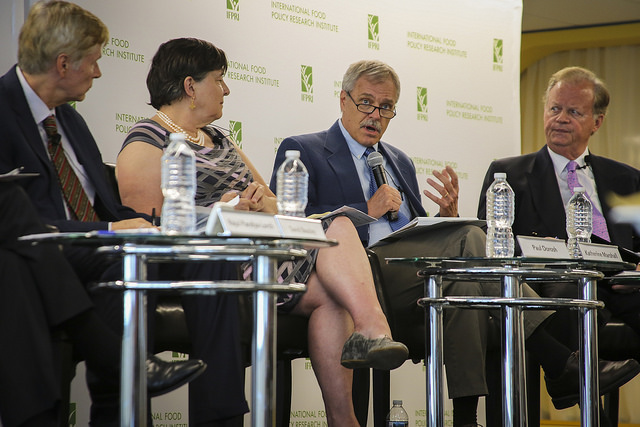With famine active amid a sustained drought, over 20 percent of households in South Sudan, Nigeria, Yemen, and Somalia face extreme food shortages with limited ability to cope. Death rates in these countries exceed two per 10,000 people per day, and serious malnutrition affects more than 30 percent of the entire population.
“Famine is our collective shame,” said IFPRI Director General Shenggen Fan, addressing the recent IFPRI policy roundtable “Tackling Famine in the Twenty-First Century,” which explored what we need to know to address the current grave humanitarian crisis and do differently to avert future disasters.
“We need to end the wars,” urged David Beasley, Executive Director of the U.N. World Food Programme. The current famine is largely attributed to conflict, he said, and achieving U.N. Sustainable Development Goal 2, ending global hunger by 2030, is not possible unless the problem of conflict is addressed.
“What kinds of shocks can we help people be more resilient to?” asked Daniel Maxwell, the Henry J. Leir Professor in Food Security at Tufts University’s Friedman School of Nutrition. One cannot build resilience to naval blockades and aerial bombardments, Maxwell said, but the lessons learned from fostering environmental and climate resiliency can be applied to conflict and political challenges. The international community must come to grips with the issue of humanitarian access, he said, seeing to it that people in need can get assistance or can find their ways to assistance.
Reflecting on past experiences with famine, Tony P. Hall, Executive Director Emeritus of the Alliance to End Hunger, reminded the audience that tremendous strides have been made and hunger has been more than halved since the 1980s. Concerned that a lot of poor people could still get hurt, Hall proposed building up civil society’s capacity to improve food security—citing Ghana as a success story. “Don’t leave advocacy to your neighbor,” Hall urged, saying everyone needs to get engaged to fight famine.
Research on famines has contributed to good policies and investments in Bangladesh and Ethiopia, explained Paul Dorosh, the Director of the Development Strategy and Governance division at IFPRI. Sound analysis, he said, led to government investments in agriculture, roads, safety nets, and telecommunications in those countries, resulting in substantial progress over time that has helped head off potential famines.
Katherine Marshall, a Senior Fellow at the Berkley Center for Religion, Peace, and World Affairs at Georgetown University, and the Executive Director of the World Faiths Development Dialogue, stressed the importance of religious organizations in mitigating conflict and associated humanitarian disasters. The densest social networks in all four countries currently affected by famine are religious, she said, and the role that they could play in bringing about peace has been largely undervalued. Women and children are suffering most, Marshall added, cautioning that engaging all partners is critical if long term success is to ever be attained.
Despite the acute crisis in Africa, we cannot forget that 800 million persons not in famine zones are also hungry and an additional 2 billion suffer from hidden hunger, Fan said, concluding the discussion. Famine can be traced to policy failure in many cases, he noted, and IFPRI is committed to tackling it by scaling up its research on both short-term relief and long-term development mechanisms.
Katarlah Taylor is an Information and Knowledge Management Facilitator at IFPRI.







